 Back in 2017, I attended a tango class for beginners – and low and behold I fell in love with this complex and beautiful dance between the sexes. It started as just a weekly dance class, but as time went on, I become more deeply involved, until it blossomed into a passion that consumes a lot of time. Ah, such heaven. But it also consumes a fair amount of money… From classes, to dances, to private lessons to travel to shoes…
Back in 2017, I attended a tango class for beginners – and low and behold I fell in love with this complex and beautiful dance between the sexes. It started as just a weekly dance class, but as time went on, I become more deeply involved, until it blossomed into a passion that consumes a lot of time. Ah, such heaven. But it also consumes a fair amount of money… From classes, to dances, to private lessons to travel to shoes…
Many of my clients also have engaging hobbies- horseback riding, mountain climbing, drag racing, bee keeping, sailing, oil painting… The list goes on. It’s actually one of my favorite parts of my practice- learning about and supporting people’s different interests. And I consider it a sacred duty to help people find the money to pursue interests that they fear they can’t afford.
Having a passion, or an engaging hobby, adds such zest to your life. It’s about enjoying life in the now and living fully in the present. We can’t live only for a future where debts are paid off and retirement is funded. We have to also live in the present and enjoy the life we have right now.
So- the question is- how do we live our financial lives in balance and make sure that we are also attending to the future needs of retirement, as well as taking care of life necessities like home maintenance and the needs of dependent children? The answer is to work with a nourishing monthly spending plan, protect your needs while also naming your wants, and then develop an annual plan to create the lifestyle you want. Read on.
Naming our passions is powerful
I could write a book about the power of creating a monthly spending plan process, but in a few short paragraphs, a spending plan is about creating a plan for where you want to spend your money, and making sure that what is important to you, is protected. It also allows you to see how to reallocate your resources from places that are less important to places that are more important- like your passions.
It is important to give your interests room in your money life. Don’t deny them! And the best way to protect them is to fully name them in your personal spending plan. A colleague of mine, Bari Tessler, author of The Art of Money, calls this “values-based bookkeeping”. Giving your values a personalized name, helps ensure that you not only name, but claim what is important to you. And a plan gives you a roadmap to actually make it happen- it ensures that when you decide where your money goes, the money goes to tango class and doesn’t leak out the door to things that may be nice, but don’t bring you as much JOY.
Each month I create a monthly plan and within it are predictable things like bills, the mortgage payment and other life necessities, as well as my tango plan for the month. You would see my plan for classes, and dances and of course shoes. I may see I need to spend less money eating out to protect this dance passion. Which brings us to the hot topic of needs vs. wants…
Creativity in Spending- Needs Vs. Wants
We often confuse our needs and our wants. And in things that we are passionate about, we simply don’t think clearly. It feels like a combined NEED/WANT/DESIRE.
Discerning needs from wants is a core tenet in creating a healthy relationship to money and in creating a healthy life. To put it simply, we want to make sure we fund our real needs first, before we spend money on our wants. As my colleague Karen McCall writes (author of Financial Recovery– developing a healthy relationship with money), faulty electrical wiring in the walls should be taken care of in our home before we cover the walls with pretty wallpaper!
However, when we think of our passions as “just wants” we begin to fear that we can’t afford them or shouldn’t spend money on them. We may feel they are a luxury. Indeed, some people feel like everything outside of basic housing and food is a want. And yes, it can feel confusing when there are people in the world starving while we have plenty to eat. So who are we to say that dancing, or horseback riding, is a need?
It is different for everyone, of course, but many passions are good for our emotional, physical and/ or spiritual health. They are part of how we enjoy the life we have. They keep us anchored to the present instead of always waiting for the future to arrive.
When I ask my friend Ken if he wants to go out dancing, he will often respond, “I NEED to go out dancing”. Dancing regularly is key to his physical health, as well as keeping him anchored in community and friends. Name and claim this need.
But of course there are wants too. I may “need” to dance, for my own health and happiness as well, but I also want nicer dance clothes, more dance shoes and travel to tango festivals in faraway places. So it helps me to differentiate between what I need vs. what I want. To help you think through your own needs vs wants conundrum, I will share some of mine:
- I need to dance. I want to dance in Bueno Aires.
- I need good tango shoes that support and protect my feet. I want five pairs of glittery shoes in different colors.
- I need clothes that don’t make me feel self-conscious. I want new pretty clothes from fancy stores.
- I need community and time with my friends. I want to eat in nice restaurants before every dance.
Darn those needs vs. wants. But once I thought through it, I saw I could meet the needs- and even some of the wants- by getting creative. For example, I could see my friends (need) by only meeting them for drinks instead of dinner, or inviting my friends to my house for a potluck meal. I could buy my first tango shoes in a neutral color that go with everything (tan). And I could switch to consignment store shopping to afford all the fun clothes I now wanted. (I quickly realized that all my tango friends already figured this one out.)
What about you? You may need a decent saddle but want a new fancy one. You may need art supplies but you may want a LOT of art supplies. You may need to sail but want to buy your own boat. And so it goes.
(For a deeper dive, see my post on how discern your real needs and heal deprivation.)
Life Style Decisions
And what about traveling to Bueno Aires? It’s a rare tango dancer who doesn’t think about that one. And this brings us to the last subject: working with an annual plan.
I have an annual plan (budget) and that is where I dream and debate the big picture. Annual plans are the place to make decisions and see what you really can and cannot afford. They are where we strive to create a balanced lifestyle where our spending is under our income. (I use and recommend MoneyGrit. for creating both monthly and annual spending plans.)
So could I afford to go to Bueno Aires? Well, when I added up all the tango related expenses that I wanted to protect, as well as some travel to smaller festivals, Bueno Aires did not work. (Obviously, my annual plan has many non-tango related expenses as well, like helping my son with college.) Alas. So next year, I will definitely strategize how to get it in. In the meantime, I’ll enjoy local dance festivals and time with friends.
What do YOU want to protect?
 I have many priorities, like funding retirement, but I really do want to protect tango. So what interests and passions do YOU want to protect? If you name what gives you joy, and prioritize this, you can protect it. Even if you have to find creative ways to enjoy your interests, your interests deserve time and attention. They are part of living a well-balanced- and a well-lived- life.
I have many priorities, like funding retirement, but I really do want to protect tango. So what interests and passions do YOU want to protect? If you name what gives you joy, and prioritize this, you can protect it. Even if you have to find creative ways to enjoy your interests, your interests deserve time and attention. They are part of living a well-balanced- and a well-lived- life.
I’m off to dance.
 When I met Rebecca, she was in her early forties.
When I met Rebecca, she was in her early forties.
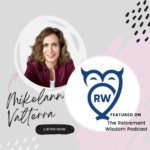
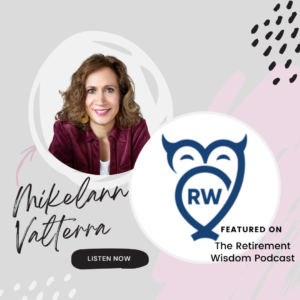

 Tell me, what is it you plan to do with your one wild, and precious life? – Mary Oliver, American Poet
Tell me, what is it you plan to do with your one wild, and precious life? – Mary Oliver, American Poet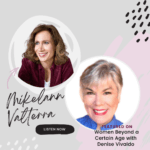
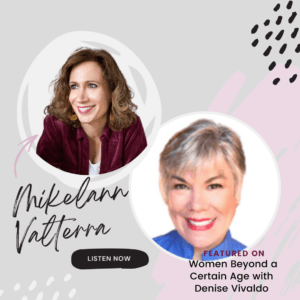

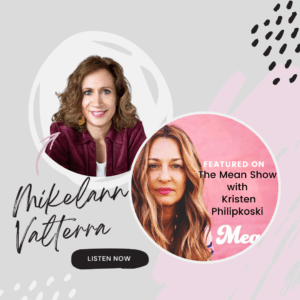
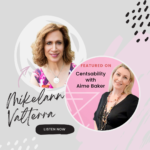
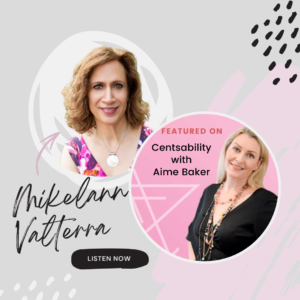 The airwaves took me to Australia this month where I guested on Financial Advisor and Money Mindset Coach Amie Baker’s podcast, Centsability. Listen to this lively conversation where we cover it all. Why do women stress over money? What do our childhoods have to do with how we feel about money? How can we feel truly abundant? This is a deep dive and you’ll love it.
The airwaves took me to Australia this month where I guested on Financial Advisor and Money Mindset Coach Amie Baker’s podcast, Centsability. Listen to this lively conversation where we cover it all. Why do women stress over money? What do our childhoods have to do with how we feel about money? How can we feel truly abundant? This is a deep dive and you’ll love it.
 Dare I say there is a silver lining to divorce? Well, there is. You get a fresh start in so many ways. And your relationship to money is one of these “fresh start opportunities”.
Dare I say there is a silver lining to divorce? Well, there is. You get a fresh start in so many ways. And your relationship to money is one of these “fresh start opportunities”.
 Back in 2017, I attended a tango class for beginners – and low and behold I fell in love with this complex and beautiful dance between the sexes.
Back in 2017, I attended a tango class for beginners – and low and behold I fell in love with this complex and beautiful dance between the sexes. I have many priorities, like funding retirement, but I really do want to protect tango. So what interests and passions do YOU want to protect? If you name what gives you joy, and prioritize this, you can protect it. Even if you have to find creative ways to enjoy your interests, your interests deserve time and attention. They are part of living a well-balanced- and a well-lived- life.
I have many priorities, like funding retirement, but I really do want to protect tango. So what interests and passions do YOU want to protect? If you name what gives you joy, and prioritize this, you can protect it. Even if you have to find creative ways to enjoy your interests, your interests deserve time and attention. They are part of living a well-balanced- and a well-lived- life.
 Whether you are a therapist, a life coach, business coach or money coach, you are in a position to help women create better lives for themselves. It is sacred and intimate work being invited into someone’s life. Of the many topics you work with, I want to invite you to add money to your list. So many women long to have more freedom, create a life of their own choosing, and have less stress, but often one of the culprits that holds them back is money.
Whether you are a therapist, a life coach, business coach or money coach, you are in a position to help women create better lives for themselves. It is sacred and intimate work being invited into someone’s life. Of the many topics you work with, I want to invite you to add money to your list. So many women long to have more freedom, create a life of their own choosing, and have less stress, but often one of the culprits that holds them back is money.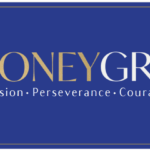
 The other day someone asked me what financial program I recommend. That is an easy one for me—MoneyGrit. The answer is easy, but the question is, why?
The other day someone asked me what financial program I recommend. That is an easy one for me—MoneyGrit. The answer is easy, but the question is, why?